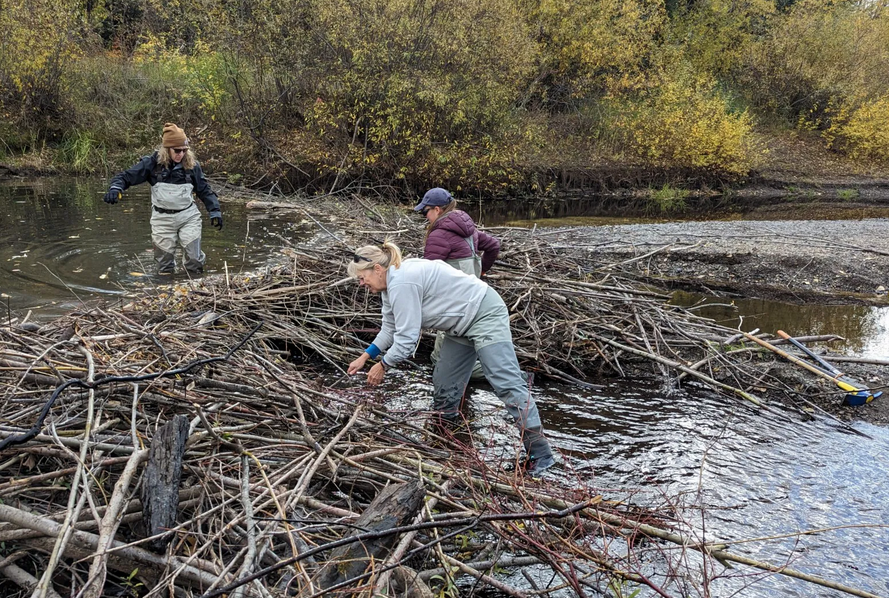I didn’t know there was a Christian Canadian Newspaper. I guess why not. But this article caught my attention. Perfect for Easter weekend. Only true believers need apply.
 Salmon vs beaver?
Salmon vs beaver?
Restoring beavers and coho to a mutually beneficial relationship.
 On one of my first days out looking for adult coho salmon on the Upper Bulkley River near Houston, B.C., I was taught how to notch a beaver dam. We carefully pulled sticks out of the dam to create a one-metre-wide opening so that salmon could migrate upstream, leaving the beaver habitat relatively unaffected. Some people view this as unnecessary. After all, haven’t beavers and salmon lived together for generations? Unfortunately, human development and action have put beavers and salmon in conflict in the Upper Bulkley.
On one of my first days out looking for adult coho salmon on the Upper Bulkley River near Houston, B.C., I was taught how to notch a beaver dam. We carefully pulled sticks out of the dam to create a one-metre-wide opening so that salmon could migrate upstream, leaving the beaver habitat relatively unaffected. Some people view this as unnecessary. After all, haven’t beavers and salmon lived together for generations? Unfortunately, human development and action have put beavers and salmon in conflict in the Upper Bulkley.
The river itself has changed. In some sections of the Upper Bulkley River we get a taste of what the river may have looked like historically. There are complex “braided” sections – islands dividing multiple channels, and side channels inundated during high flows. But most of the river and the creeks feeding into it flow in a single channel. On Google Maps satellite imagery, it’s easy to see the straightening of the river where it has been constricted to the edge of its floodplain by the railway. The railway has been elevated on large levees. And so instead of meandering through its floodplain during freshet (snow melt), the river shoots through these straightened sections. Even when it reaches a less constricted area, it has so much momentum that it can’t switch to slow meandering. With only one channel, there’s only one place for both beavers and fish.
Hmm. I guess one of them has to change their ways and everybody likes salmon. Hardly anyone likes beavers.
Adult Pacific Salmon migrate from the ocean to the freshwater stream where they were born in order to spawn, laying their eggs. Coho salmon spawners reach the Upper Bulkley in September when the river level is still low and the beavers have already been busy building dams. A coho is a patient fish, typically waiting for pulses of fall rain to swell the system and aid their migration as the river rises up and around beaver dams. But the numbers of coho currently coming back to this river are in the hundreds, where historically it would’ve been thousands, and we want to give them the best chance to reach their spawning grounds in time. There can be up to 20 beaver dams restricting the coho’s migration on this river. With that many dams, we have found dead coho who tried and failed to get overtop. And so, with minimal disturbance to the beavers, we notch beaver dams.
I’m pretty sure all them coho are dead upriver. Right? I guess you mean they tragically died before they could mate. I guess that’s a problem. And problems can only be solved by ripping beaver dams. AmIrite?
Other areas of Canada are desperate for beavers and are re-introducing them to increase water storage. This might seem like mixed messaging, but the message is actually quite similar: poor ecosystem stewardship. Problems arise in beaver-deficient ecosystems as well as in beaver-abundant ecosystems impacted by human development. So in the Upper Bulkley River, we’ll keep notching – until a method of communication opens with the beavers on incorporating fish passage into their dam construction blueprints, or until we’re able to achieve some habitat restoration to reconnect the river with its historic floodplain and restore beavers and coho to their mutually beneficial relationship.
Okay…I guess beavers are good for drought and saving water and that sort of stuff. And I guess that people and cows and salmon and birds all need water. Okay. And burning up in wildfires is bad for everything.
But some of the salmon died before they could mate. That means we need to rip holes in beaver dams.
Here;s the problem as I see it. Those little holes you so carefully rip let the powerful water through and because of that don’t stay little for very long. The force of the water drains the pond which is okay for the beavers but is just rotten for all those little baby salmon. So next year instead of three hundred coming back you get two hundred. Then fifty. Then ten.
And every time you assume it’s because of those dams and make more notches or then blow them up entirely. and pretty soon you have zero beaver dams and zero salmon.
Funny how that works.







































